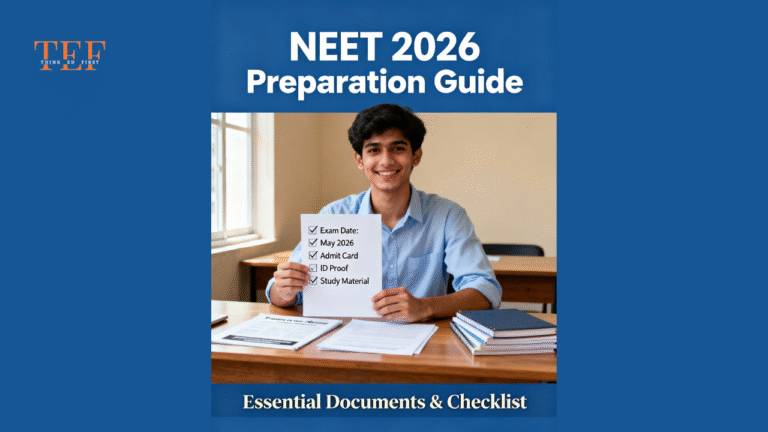What if you could turn uncertainty into confidence during your exam? Many students face questions they’re unsure about, but random guessing isn’t the solution. Instead, strategic elimination can be your secret weapon.
Objective-type exams often include tricky questions with multiple options. By understanding the format and negative marking system, you can narrow down choices effectively. This approach helps you avoid penalties and boosts your score.
In this article, we’ll explore how to identify incorrect options and make informed decisions. These techniques can transform how you approach challenging questions, giving you an edge in your preparation.
Introduction: Navigating the NEET Challenge
The NEET exam is a pivotal moment for medical aspirants in India. It’s not just a test of knowledge but also a challenge of strategy and focus. With an extensive syllabus covering Physics, Chemistry, and Biology, students need a clear plan to tackle it effectively.
Overview of NEET Exam Structure
The NEET exam follows a well-defined pattern. It includes 180 multiple-choice questions divided into three sections: Physics, Chemistry, and Biology. Each correct answer awards +4 marks, while incorrect ones deduct -1 mark. This scoring system makes it crucial to answer wisely.
Understanding the syllabus is key. NCERT textbooks for Class 11 and 12 form the foundation of the exam. Regular practice with previous years’ papers helps students identify their strengths and weaknesses, ensuring better preparation.
Importance of Smart Elimination Techniques
In a highly competitive exam like NEET, every mark counts. Smart elimination techniques can help students navigate tricky questions. By identifying and removing incorrect options, they can increase their chances of selecting the right answer.
Here are some practical tips for students:
- Focus on high-yield topics that carry more weightage.
- Use keywords in questions to guide your answers.
- Practice mock tests weekly to build stamina and familiarity.
These strategies not only improve eligibility but also boost confidence during the exam. With proper preparation and practice, students can turn challenges into opportunities for success.
Understanding NEET MCQs and Their Intricacies
Mastering the art of tackling multiple-choice questions can significantly boost your exam performance. These questions are designed to test not just your knowledge but also your ability to analyze and eliminate incorrect options. Understanding their structure and patterns is crucial for success in competitive exams like the NEET-UG 2025.
Exam Format and Negative Marking
The NEET exam follows a specific pattern with 180 multiple-choice questions. Each correct answer awards +4 marks, while incorrect ones deduct -1 mark. This negative marking system emphasizes the importance of careful answering. Below is a breakdown of the marking scheme:
| Question Type | Marks Awarded | Marks Deducted |
|---|---|---|
| Correct Answer | +4 | 0 |
| Incorrect Answer | 0 | -1 |
| Unanswered Question | 0 | 0 |
Common Challenges in Multiple Choice Questions
Deciphering complex concepts in MCQs can be challenging. Students often struggle with similar-looking options and time constraints. Here are some common issues:
- Misinterpreting the question stem due to haste.
- Selecting extreme outliers that are rarely correct.
- Overlooking keywords that guide the correct choice.
By understanding these challenges and practicing regularly, you can improve your ability to analyze each question effectively. This process will help you identify the right answer even in tricky scenarios.
Smart Strategies: neet mcq guessing techniques
Strategic elimination is more than a technique—it’s a mindset for success. When faced with uncertainty, combining logic with confidence can lead to better outcomes. This approach helps you navigate tricky questions effectively, ensuring you make the most of every opportunity.
The Rationale Behind Educated Guessing
Educated guessing relies on a systematic strategy to narrow down options. By eliminating incorrect choices, you increase your chances of selecting the correct answer. This method is particularly useful in competitive exams where every mark counts.
For example, if you can eliminate two out of four options, your probability of choosing the right answer doubles. This approach not only saves time but also reduces the risk of negative marking.
Balancing Confidence with Caution
Confidence plays a key role in decision-making, but it must be balanced with caution. Trust your instincts when you’re reasonably sure of an answer, but rely on elimination when in doubt. This balance ensures you make informed choices without overthinking.
Practice is essential to build this skill. Regular mock tests help you understand when to trust your gut and when to apply a systematic approach. Over time, this strategy becomes second nature, giving you an edge in the exam.
Strategies to Eliminate Wrong Options Effectively
Effective elimination of wrong options can be a game-changer in competitive exams. By systematically removing incorrect choices, you increase your chances of selecting the right answer. This approach is especially useful in multiple-choice questions where time and accuracy are critical.
Identifying Outliers and Extremes
One of the simplest ways to eliminate options is by identifying outliers. These are choices that seem extreme or unrelated to the question. For example, if three options are closely related and one stands out as unrelated, it’s likely incorrect.
Here’s how to spot outliers:
- Look for options that are too broad or too specific.
- Identify choices that contradict the question’s context.
- Discard options that include absolute terms like “always” or “never.”
Using the Process of Elimination
The process of elimination involves narrowing down choices step by step. Start by removing options you’re certain are wrong. Then, compare the remaining choices to find the best fit. This method reduces guesswork and improves accuracy.
Follow these steps:
- Read the question carefully and understand its requirements.
- Eliminate options that are clearly incorrect.
- Compare the remaining choices using logic and context.
- Select the most appropriate answer.
Time Management and Prioritization Techniques
Time is your most valuable resource during any exam, and managing it wisely can make all the difference. In competitive exams like NEET, effective time management ensures you can tackle every question with confidence and precision. Without a clear plan, even the most prepared students can struggle to complete the test on time.
Planning Exam Rounds Strategically
One of the best ways to manage your time is by dividing the exam into rounds. Start with the first round, where you answer all the easy questions. This builds momentum and ensures you secure marks quickly. In the second round, focus on moderately difficult questions. Save the toughest ones for the final round, if time permits.
Here’s a simple breakdown of how to plan your rounds:
| Round | Focus | Time Allocation |
|---|---|---|
| Round 1 | Easy Questions | 40 minutes |
| Round 2 | Moderate Questions | 50 minutes |
| Round 3 | Tough Questions | 30 minutes |
Allocating Time for Easy versus Tough Questions
Not all questions are created equal. Some are straightforward, while others require deeper thinking. Allocate more time to questions you’re confident about and less to those that are challenging. This approach ensures you maximize your score without getting stuck on difficult problems.
Here are some tips for effective time allocation:
- Spend 1-2 minutes on easy questions to save time for tougher ones.
- If a question seems too difficult, mark it and move on. Return to it later if time allows.
- Practice mock tests regularly to get a feel for time management under exam conditions.
Regular practice is key to mastering these techniques. Mock tests help you identify your strengths and weaknesses, ensuring you’re fully prepared for the exam day. By planning your rounds and allocating time wisely, you can approach the test with confidence and efficiency.
Subject-Wise Approaches to NEET MCQs
Tailoring your approach to each subject can significantly enhance your exam performance. Biology, Chemistry, and Physics each have unique demands, and understanding these differences is key to mastering the exam. Let’s explore customized tips for each subject to help you focus on key concepts and application methods.
Biology: Focus on Concepts and Application
Biology often requires a balance of memorization and application. Focus on high-yield topics like Genetics, Ecology, and Human Physiology. Regular revision of NCERT textbooks is crucial, as many questions are directly sourced from them.
Here are some tips for Biology:
- Memorize scientific names and key definitions.
- Practice diagram-based questions to improve accuracy.
- Use flashcards for quick revision of important concepts.
Chemistry: Mastering Theory and Problem-Solving
Chemistry is divided into Physical, Organic, and Inorganic sections. Physical Chemistry involves numerical problems, while Organic Chemistry focuses on reactions and mechanisms. Inorganic Chemistry requires memorization of facts and periodic trends.
Here’s how to approach Chemistry:
- Practice numerical problems regularly to build speed and accuracy.
- Understand reaction mechanisms rather than rote learning.
- Focus on NCERT for Inorganic Chemistry, as it’s highly scoring.
Physics: Emphasize Problem-Solving Skills
Physics is application-heavy and requires strong problem-solving skills. Topics like Mechanics, Electrodynamics, and Modern Physics are frequently tested. Practice is essential to understand the application of formulas and concepts.
Here are some Physics-specific strategies:
- Solve previous years’ papers to understand question patterns.
- Focus on derivations and their applications in problem-solving.
- Use stepwise approaches for complex numerical problems.
Regular revision and targeted practice can increase your eligibility and improve overall application success. By focusing on subject-specific strategies, you can approach the exam with confidence and precision.
Leveraging Contextual Cues and Keywords
Understanding the context of a question can be the key to unlocking the right answer. In multiple-choice exams, questions often contain subtle hints that guide you toward the correct option. By paying attention to these details, you can simplify the process of elimination and improve your accuracy.
Marking Keywords in the Question Stem
One of the most effective strategies is identifying keywords within the question stem. These words often highlight the main idea or the specific requirement of the question. For example, if a question asks for the “primary function” of a system, focus on terms like “primary” and “function” to narrow down your options.
Here’s how to mark keywords effectively:
- Underline or highlight important terms in the question.
- Look for words that indicate a specific pattern or form.
- Use these keywords to eliminate unrelated options.
Utilizing Synonyms and Related Phrases
Another useful technique is recognizing synonyms or related phrases in the options. Sometimes, the correct answer may not use the exact wording of the question but conveys the same idea. For instance, if the question mentions “energy conversion,” an option discussing “transformation of energy” could be the right choice.
Here are some tips for using synonyms:
- Identify words in the question that have similar meanings in the options.
- Focus on the context to ensure the synonym fits logically.
- Practice with previous papers to improve your ability to spot related phrases.
By maintaining attention to details like wording and structure, you can simplify the process of eliminating incorrect options.
Additional Expert Insights and Practical Applications
Expert strategies can transform your preparation and boost your results. By learning from top resources and avoiding common pitfalls, you can refine your approach and achieve your goals. Let’s explore how to apply these insights effectively.
Learning from Top Resources
Top resources like NCERT textbooks and mock tests are essential for success. They provide a clear understanding of the syllabus and help you identify high-yield topics. Here’s a summary of key resources and their benefits:
| Resource | Benefits |
|---|---|
| NCERT Textbooks | Foundation for syllabus coverage and concept clarity. |
| Mock Tests | Simulate exam conditions and improve time management. |
| Previous Years’ Papers | Reveal question patterns and high-weightage topics. |
Avoiding Common Pitfalls and Last-Minute Errors
Many students make mistakes due to stress or lack of practice. Here are some common pitfalls and how to avoid them:
- Rushing through questions: Take time to read each question carefully.
- Ignoring negative marking: Avoid random guesses to prevent mark deductions.
- Overlooking revision: Regularly revisit key topics to retain information.
Regular practice with mock tests and previous years’ papers is crucial. It helps you understand the exam pattern and improves your accuracy. Balancing academic preparation with exam-day strategies ensures the best possible result.
Conclusion
Success in competitive exams hinges on a blend of preparation and strategy. By carefully analyzing each option and applying logical reasoning, students can improve their chances of selecting the right answer. This approach not only boosts confidence but also minimizes the risk of losing marks.
Integrating these strategies into daily routines is essential. Regular practice with mock tests helps students identify patterns and refine their problem-solving skills. Attention to detail and time management further enhance their readiness for the exam day.
Focus on high-yield concepts and prioritize clarity when answering questions. By combining thorough preparation with smart decision-making, students can maximize their scores and achieve their goals. Stay consistent, practice diligently, and approach the test with confidence.





